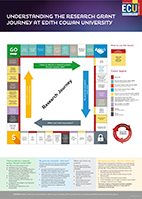A research award typically involves a journey with six stages. As a first step it’s important to understand the difference between ‘research’ and ‘consultancy’. Members of the University undertaking research are also required to be aware of the provisions of the Australian Code for the Responsible Conduct of Research, any Sanctions that may be applicable and relevant University policies and guidelines governing responsible practice in research.
Funding
The processes for applying and managing funding will vary according to the type of organisation that will be funding the research.
Different processes also apply depending on whether you are seeking funding for research or a consultancy.
Preparing your application
For an Early Career Researcher, and quite possibly more experienced researchers, developing research ideas into fundable projects or into a publication can be a daunting task and usually raises a lot of questions, such as:
- How to write an application so that it stands out from the crowd?
- Which journals should be targeted?
- Which would be the best research methodology to employ?
- If applying for an Australian Research Council grant, or perhaps the National Health and Medical Research Council, how to know if your track record is competitive?
- If not, what are your other options to best advance your career?
- What about ECU’s internal funding schemes?
- Is your project eligible?
- Are you eligible?
- Does my project meet the definition of research; is it research or a consultancy?
Allow plenty of time to develop your research idea, your funding application or your publication, especially if you need to involve a collaborating partner. Your application may require a number of rewrites to make it shine amongst its competitors and this is difficult to do if you prepare it close to the closing date.
When preparing your funding application think about what publications may arise from the research and in what journals these should be published for greatest impact.
Community Advocacy in Health and Medical Research
The Consumer and Community Health Research Network provides consumer advocacy at ECU to support researchers, consumers and community members to work in partnership to make decisions about health research priorities, policy and practice. This includes assistance with grant applications and existing or new involvement activities.
Talk to your colleagues
It is important to discuss your intended research project with your School Dean and/ or your line manager. The Dean is responsible for allocation and use of school resources, including your time (in-kind) and any infrastructure or additional funding needed to support the project.
As colleagues, they may also have valuable suggestions to make regarding the design and implementation of your project and be able to provide advice on potential collaborators and peer reviewers.
If significant financial support is needed for the application they will need time to discuss this with the Deputy Vice-Chancellor (Research) and the Director of Research Services.
Intellectual property
Discussions around the ownership and use of Intellectual Property (IP) should be held early and often during development of a project to ensure the project partners develop a shared understanding IP ownership and how commercialisation or translation of research outcomes will happen.
Questions to be covered could include:
- Which entity will own the IP?
- Will licenses be provided to non-owners and if so are there any conditions on use?
- Will publication, further research and teaching from the IP be an option for academic partners and again what conditions may be put in place?
- Which entity will commercialise the IP?
- If applicable what will be the revenue sharing options from commercialised IP?
Developing this accord early in the process can prevent misunderstandings from arising at crucial times during the project or after it finishes.
